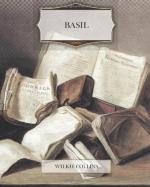Thus it is as no leisure work that I begin my narrative—and begin it, too, on my birthday! On this day I complete my twenty-fourth year; the first new year of my life which has not been greeted by a single kind word, or a single loving wish. But one look of welcome can still find me in my solitude—the lovely morning look of nature, as I now see it from the casement of my room. Brighter and brighter shines out the lusty sun from banks of purple, rainy cloud; fishermen are spreading their nets to dry on the lower declivities of the rocks; children are playing round the boats drawn up on the beach; the sea-breeze blows fresh and pure towards the shore——all objects are brilliant to look on, all sounds are pleasant to hear, as my pen traces the first lines which open the story of my life.
II.
I am the second son of an English gentleman of large fortune. Our family is, I believe, one of the most ancient in this country. On my father’s side, it dates back beyond the Conquest; on my mother’s, it is not so old, but the pedigree is nobler. Besides my elder brother, I have one sister, younger than myself. My mother died shortly after giving birth to her last child.
Circumstances which will appear hereafter, have forced me to abandon my father’s name. I have been obliged in honour to resign it; and in honour I abstain from mentioning it here. Accordingly, at the head of these pages, I have only placed my Christian name—not considering it of any importance to add the surname which I have assumed; and which I may, perhaps, be obliged to change for some other, at no very distant period. It will now, I hope, be understood from the outset, why I never mention my brother and sister but by their Christian names; why a blank occurs wherever my father’s name should appear; why my own is kept concealed in this narrative, as it is kept concealed in the world.
The story of my boyhood and youth has little to interest—nothing that is new. My education was the education of hundreds of others in my rank of life. I was first taught at a public school, and then went to college to complete what is termed “a liberal education.”
My life at college has not left me a single pleasant recollection. I found sycophancy established there, as a principle of action; flaunting on the lord’s gold tassel in the street; enthroned on the lord’s dais in the dining-room. The most learned student in my college—the man whose life was most exemplary, whose acquirements were most admirable—was shown me sitting, as a commoner, in the lowest place. The heir to an Earldom, who had failed at the last examination, was pointed out a few minutes afterwards, dining in solitary grandeur at a raised table, above the reverend scholars who had turned him back as a dunce. I had just arrived at the University, and had just been congratulated on entering “a venerable seminary of learning and religion.”




